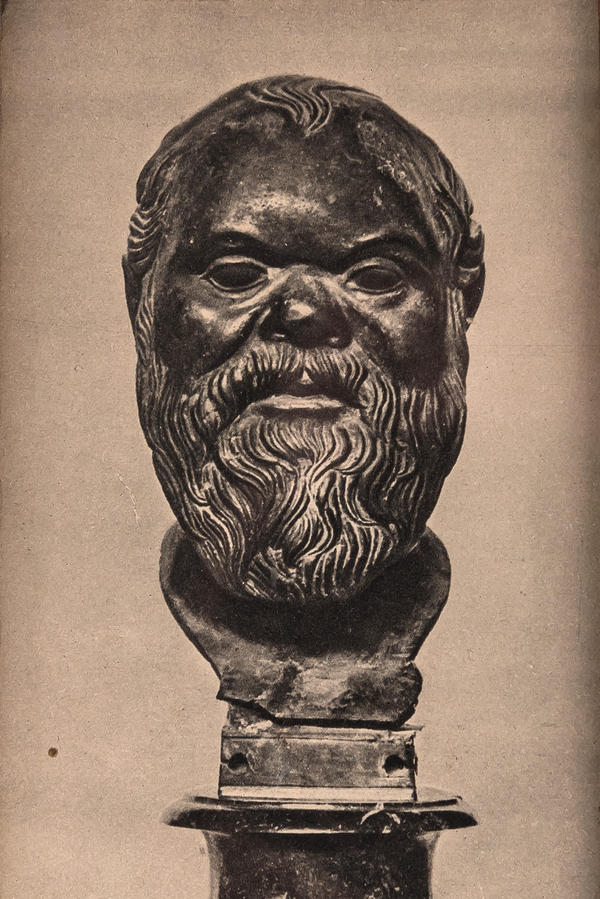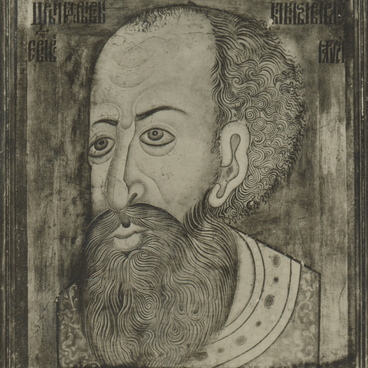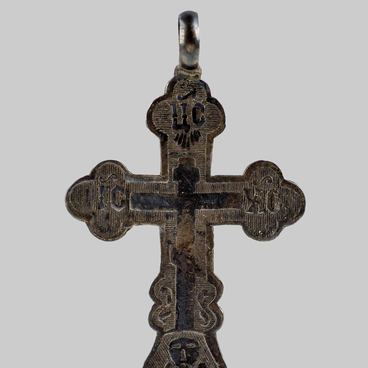Eisenstein acquired a postcard depicting a bust of the ancient Greek philosopher SOcrates (470/469 BC–399 BC) in Germany or, possibly, in a used book store in Moscow. The antique bust itself is kept in Munich GlYptothek (a collection of works of ancient Greek and Roman sculpture). Eisenstein tucked the postcard into an old frame and hung it on the bookshelf, right below the photograph of Frederic-Lemaitre and the profile portrait of Edgar Degas.
Sergei Eisenstein said that Socrates was the best teacher in the history of mankind because he did not utter ‘ultimate truths’ and did not offer ready solutions for various issues, but posed questions to his interlocutors and taught them to think and look for answers themselves. Eisenstein also discussed the solution to each problem when staging educational sketches together with students in a ‘slow creative process’. He called the group of students ‘the twenty-headed director’ and strove to teach his students the methods of art so they could understand it, rather making them memorize ‘techniques.’ He considered fostering of creative individuality the foremost task of any teacher, and often joked that he doesn’t want to “raise a litter of Eisenpups”.
From his workshop in Proletkult came the comedy directors Grigory Alexandrov and Ivan Pyriev, the actors Maxim Shtraukh and Judith Glizer; from the workshop of the State Cinema School came the creators of Chapaev, the named Vasiliev brothers, directors Mark Donskoy and Vladimir Legoshin, scriptwriter Katerina Vinohradskaya; Valentin Kadochnikov, Mikhail Schweitzer, Vladimir Vengerov, Stanislav Rostotsky, Eldar Ryazanov and many others have went through his workshops.
Sergei Eisenstein not only taught classes in his workshop, of which there were many transcripts, but also compiled the world’s first film directing course for institutes and universities, wrote the textbook ‘Directing. The art of mise-en-scène “, developed a” workshop’ methodology for fostering creative skills his students, whom he treated with sincere respect. The students loved their professor and once drew a friendly cartoon on him, in which Eisenstein’s “Socratic” forehead rose above the clouds. Indeed, the outline of Eisenstein’s high forehead resembles that of the ancient Greek philosopher.
Sergei Eisenstein said that Socrates was the best teacher in the history of mankind because he did not utter ‘ultimate truths’ and did not offer ready solutions for various issues, but posed questions to his interlocutors and taught them to think and look for answers themselves. Eisenstein also discussed the solution to each problem when staging educational sketches together with students in a ‘slow creative process’. He called the group of students ‘the twenty-headed director’ and strove to teach his students the methods of art so they could understand it, rather making them memorize ‘techniques.’ He considered fostering of creative individuality the foremost task of any teacher, and often joked that he doesn’t want to “raise a litter of Eisenpups”.
From his workshop in Proletkult came the comedy directors Grigory Alexandrov and Ivan Pyriev, the actors Maxim Shtraukh and Judith Glizer; from the workshop of the State Cinema School came the creators of Chapaev, the named Vasiliev brothers, directors Mark Donskoy and Vladimir Legoshin, scriptwriter Katerina Vinohradskaya; Valentin Kadochnikov, Mikhail Schweitzer, Vladimir Vengerov, Stanislav Rostotsky, Eldar Ryazanov and many others have went through his workshops.
Sergei Eisenstein not only taught classes in his workshop, of which there were many transcripts, but also compiled the world’s first film directing course for institutes and universities, wrote the textbook ‘Directing. The art of mise-en-scène “, developed a” workshop’ methodology for fostering creative skills his students, whom he treated with sincere respect. The students loved their professor and once drew a friendly cartoon on him, in which Eisenstein’s “Socratic” forehead rose above the clouds. Indeed, the outline of Eisenstein’s high forehead resembles that of the ancient Greek philosopher.



